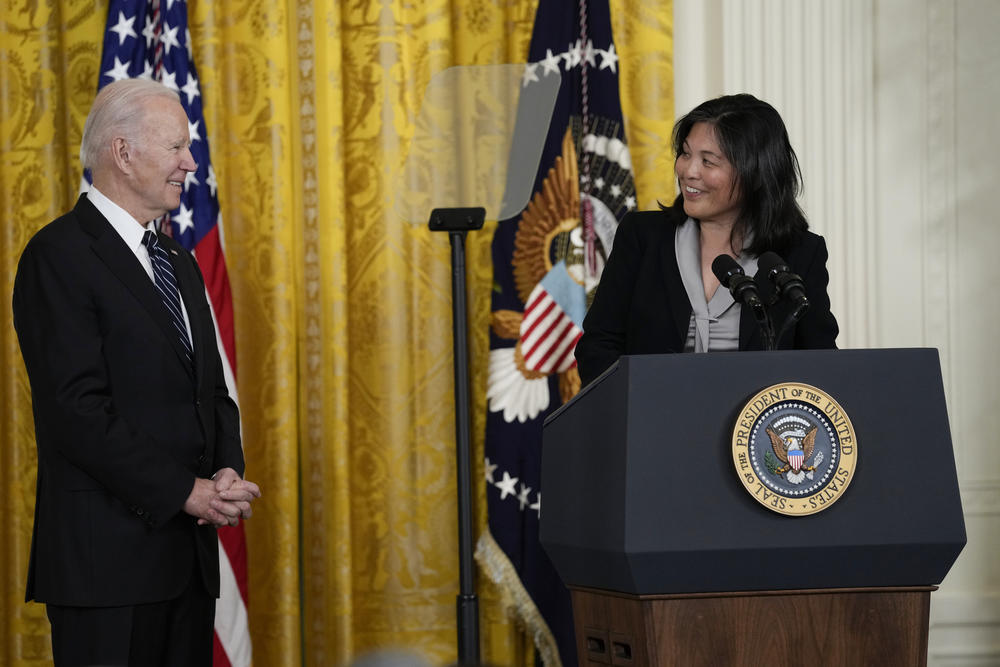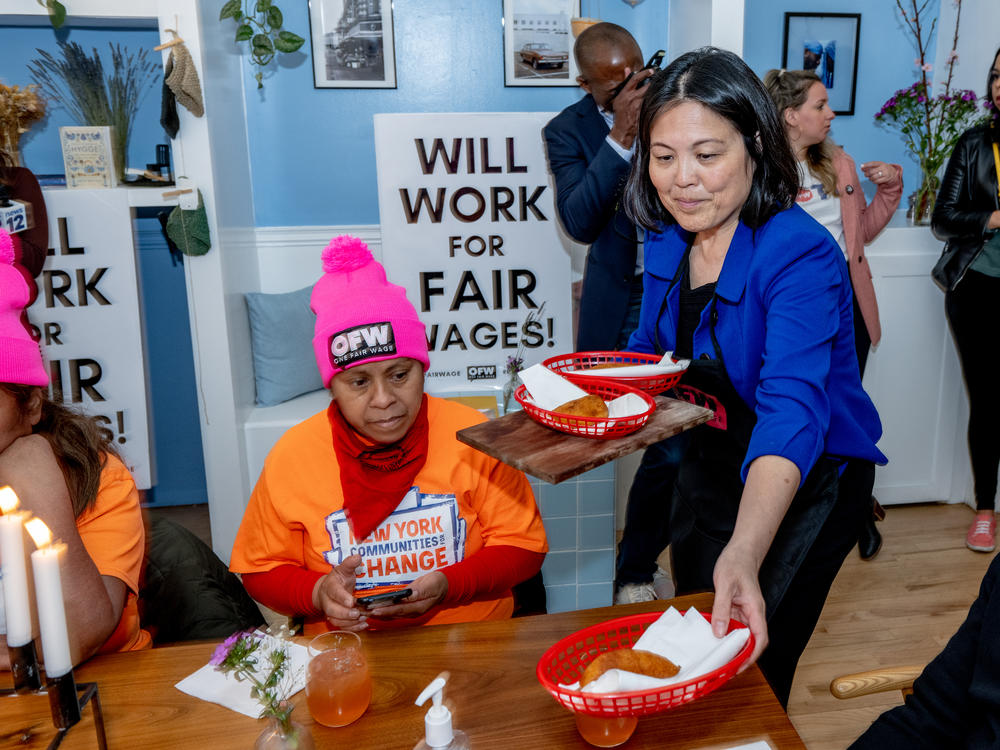Section Branding
Header Content
Julie Su, advocate for immigrant workers, is Biden's pick for Labor Secretary
Primary Content
Updated March 1, 2023 at 12:45 PM ET
Julie Su, a daughter of Chinese immigrants who spent years representing low-wage workers as a civil rights lawyer, is poised to take over the most powerful U.S. agency for labor issues.
"Julie is the American dream," said President Joe Biden at a White House event on Wednesday where he officially announced her nomination to be the next Labor Secretary.
The room, packed with members of Congress, cabinet officials, union leaders and reporters, burst into a chorus of cheers and loud applause when Biden and Su entered.
"I think they like you," Biden quipped. "If, in fact, you were not picked to be Secretary of Labor, I would be run out of town."
Asian American Democratic lawmakers and advocates had pushed Biden to nominate Su after she spent years promoting the rights of Asian American and immigrant workers. She also headed California's labor department during the pandemic, when millions were filing for unemployment.
If confirmed, she will be the first Asian American member of Biden's cabinet at the secretary level.
Su's mother first arrived in the U.S. on a cargo ship and worked a union job that came with paid leave and health benefits, helping her family move into the middle class, Su said on Wednesday.
"I believe in the transformative power of America, and I know the transformative power of a good job," Su said. "To all workers who are toiling in the shadows, to workers who are organizing for power and respect in the workplace, know that we see you."
Altogether, there are three Asian Americans currently in Biden's cabinet. U.S. Trade Representative Katherine Tai and Arati Prabhakar, who leads the White House Office of Science and Technology Policy, though, are not secretaries. Kamala Harris, the first Asian American to serve as vice president, is also a cabinet member.
Democrats control the Senate, which will need to confirm Su for the role, and she has the backing of the Congressional Asian Pacific American Caucus as well as the Congressional Black Caucus.
But her confirmation could still be contentious. California Republicans, including Rep. Young Kim, who is Korean American, wrote Biden earlier this month opposing her possible nomination, citing her role in crafting a state law known as AB5 that classifies some gig workers as employees. Critics say AB5 severely limits businesses' ability to hire freelancers.
A focus on fighting for disadvantaged people
Su has put legal fights around issues in the Asian community at the center of her career since she graduated from Harvard Law School, getting her professional start as a staff attorney at the Asian Pacific American Legal Center, now the Asian Americans Advancing Justice Southern California or AJSOCAL.
She then rose to become California's top labor official before joining the Biden administration as the deputy labor secretary. Her current boss, Labor Secretary Marty Walsh, the former mayor of Boston, is leaving the administration mid-March to lead the NHL players union.
At age 26, Su served as the lead attorney in a 1995 case that helped recover more than $4 million in wages stolen from trafficked Thai garment workers in a Los Angeles County sweatshop. After getting word that there was going to be a raid at a facility where there were largely Thai speaking workers, she accompanied members of Thai Community Development Center, who helped translate, to the site.
The case later spurred Congress to pass an anti-trafficking law in 2000 that secures visas for survivors of trafficking and forced labor.
"Her heart really is for those who are most disadvantaged in this society," said Aileen Louie, the chief of staff at AJSOCAL who is close friends with Su and whose children think of Su as an aunt.
After Harvard, Su was eager to return to California, where she attended Stanford University as an undergraduate, to help low-wage workers, particularly those in Asian restaurants, Louie told NPR in a phone interview.
Her work spread out from there, said Ai-jen Poo, a labor activist and the president of the National Domestic Workers Alliance.
"So many different sectors and communities have been touched and impacted by her work," Poo said of Su, who speaks both Mandarin and Spanish.
Poo got to know Su personally when she was California's top labor official and worked closely with California's domestic workers' coalition to inform caregivers, nannie, cleaners and others of their rights. Su's family background will help her bring a unique perspective to the role, Poo said.
"I think growing up in a community like that, you both believe that the impossible is possible in this country and you know the inequities that exist," Poo said.
Asian American Democratic lawmakers had originally pushed Biden to tap Su for labor secretary in 2021, but they ultimately fell short. Instead she was nominated to serve as deputy labor secretary, and was confirmed that July.
In a statement announcing his intent to nominate her, Biden called Su "a champion for workers," pointing out her role in helping to avert a national rail shutdown late last year and to ensure fair wages for workers in sectors such as semiconductor manufacturing, broadband and health care.
"Julie Su is a longtime advocate for workers—first in my home state of California, and now as a leader in the Biden-Harris Administration," said Vice President Harris in a statement released Tuesday. "She understands that the future of our economy depends on building a well-trained and inclusive workforce."
Copyright 2023 NPR. To see more, visit https://www.npr.org.


